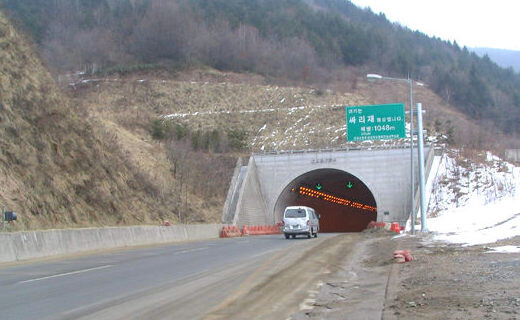hankyoreh
Links to other country sites 다른 나라 사이트 링크
Old, winding roads not charming for environment

Roads bring convenience to humans, but in the process of building and maintaining them, damage to nature is inevitable. In addition, as time passes, some roads witness an increase of traffic, but others lose their conveinence, disused into neglect.
Environmental groups have increasingly rallied for the restoration of ecosystems damaged by roads that have now lost their roles as traffic routes. Their intention is to return the roads, which have become useless to humans, back to nature.
The primary targets for these environmental groups are passes over hills or mountains. They have been rendered useless due to the construction of tunnels. As going over an elevation burns much more fuel than simply using a tunnel to go through it, on many of these old patches of road, nary a car is seen.
According to a survey conducted by Green Korea United, an environmental organization, the places where new tunnels were created to link existing roads or where construction of such tunnels are underway number about 60. Cases in point are the Ihwaryeong passage between Yeonpung-eup in North Chungcheong Province and Mungyeong-eup in North Gyeongsang Province, Dumundongjae between Gohan-eup in Jeongseon district and Hwajeon-dong in Taebaek, Gangwon Province, Norujae between Beopjeon-myeon and Socheon-myeon in North Gyeongsang Province, and Misiryeong passage between Buk-myeon and Toseong-myeon in Gangwon Province. "Myeon" and "eup" are area divisions used in the countryside.
Yun Gi-don, an official of Green Korea United, said, "Most of these uphill roads can be immediately closed because they have no impact on traffic. We should discuss the problem of removing asphalt from these sections."
The group said that restoring to nature roads passing through South Korea’s portion of the Baekdudaegan, the mountain range stretching from the north of Mt. Baekdu on the Chinese-North Korean border to Mt. Jiri in the deep south of the peninsula, should be the primary goal. To restore these roads will restore the links of a core ecosystem on the Korean peninsula, the group said, which was severed by their construction. It will also draw attention to people’s reckless approach to development in ecologically sensitive areas, it said.
The Ministry of Environment had pushed for a similar plan. When Sokcho began a project to construct a tunnel within Mt. Sorak National Park, the ministry suggested that the existing mountain pass road be restored to a "green zone." But the ministry was not taken up on its suggestion, as the national park committee decided to maintain the existing roads as roundabout routes.
There also is a strong objection against restoring these roads. Some drivers use the tortuous uphill roadways, such as Misiryeong in Gangwon Province, to avoid paying tolls. There also are those who want to enjoy the charm of motoring down old roads. Yun of Green Korea United underscored the danger of these old, out-of-use roads, Misiryeong in particular: "For the safety of those people taking the risks, the government should take over management or subsidize tolls, and discuss measures to restore Misiryeong [to nature]."
Please direct questions or comments to [englishhani@hani.co.kr]
Editorial・opinion
![[Column] Park Geun-hye déjà vu in Yoon Suk-yeol [Column] Park Geun-hye déjà vu in Yoon Suk-yeol](https://flexible.img.hani.co.kr/flexible/normal/500/300/imgdb/original/2024/0424/651713945113788.jpg) [Column] Park Geun-hye déjà vu in Yoon Suk-yeol
[Column] Park Geun-hye déjà vu in Yoon Suk-yeol![[Editorial] New weight of N. Korea’s nuclear threats makes dialogue all the more urgent [Editorial] New weight of N. Korea’s nuclear threats makes dialogue all the more urgent](https://flexible.img.hani.co.kr/flexible/normal/500/300/imgdb/original/2024/0424/7317139454662664.jpg) [Editorial] New weight of N. Korea’s nuclear threats makes dialogue all the more urgent
[Editorial] New weight of N. Korea’s nuclear threats makes dialogue all the more urgent- [Guest essay] The real reason Korea’s new right wants to dub Rhee a founding father
- [Column] ‘Choson’: Is it time we start referring to N. Korea in its own terms?
- [Editorial] Japan’s rewriting of history with Korea has gone too far
- [Column] The president’s questionable capacity for dialogue
- [Column] Are chaebol firms just pizza pies for families to divvy up as they please?
- [Column] Has Korea, too, crossed the Rubicon on China?
- [Correspondent’s column] In Japan’s alliance with US, echoes of its past alliances with UK
- [Editorial] Does Yoon think the Korean public is wrong?
Most viewed articles
- 1‘We must say no’: Seoul defense chief on Korean, USFK involvement in hypothetical Taiwan crisis
- 2‘Weddingflation’ breaks the bank for Korean couples-to-be
- 3[Reportage] On US campuses, student risk arrest as they call for divestment from Israel
- 4[Column] Park Geun-hye déjà vu in Yoon Suk-yeol
- 5Amnesty notes ‘erosion’ of freedom of expression in Korea in annual human rights report
- 6Korea sees more deaths than births for 52nd consecutive month in February
- 7N. Korean delegation’s trip to Iran shows how Pyongyang is leveraging ties with Moscow
- 8Will NewJeans end up collateral damage in internal feud at K-pop juggernaut Hybe?
- 9[Guest essay] The real reason Korea’s new right wants to dub Rhee a founding father
- 10N. Korean hackers breached 10 defense contractors in South for months, police say